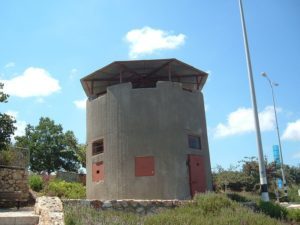June 1, 1938 Tegart’s Wall
Britain by John Murray Ltd in 1956, p. 104-107
June 1, 1938 Arab Murder, Mayhem, and Massacre
Tegart’s Wall:
“The Palestine Government is proposing to build a barbed wire wall across the frontiers between Palestine and the Lebanon, Syria and Transjordan. The scheme, which was suggested by Sir Charles Tegart, adviser to the Government on the suppression of terrorism, will cost £90,000 and will extend for about fifty miles.
“it is hard to resist the conclusion that certain Syrian politicians and officials have shown more than a platonic sympathy with the (eg. Arab) revolutionaries… When it is completed, the barbed wire wall should make the Arab agitators’ power for mischief considerably less”
‘It will extend for about fifty miles from the coastal road at Ras en Nakura eastwards to Nebi Yusha (Metullah) and curve down to the Huleh marshes. Jewish colonies at that point form a barrier, but the fence resumes at Rosh pinna and extends to Tabigha on the Sea of Galilee, which in turn will be patrolled by motor-launches. South of the Sea of Galilee a two-and-a-half-mile stretch as far as the mouth of the Yarmuk River will be fenced. Plans are being made for obstructing the passage of the Jordan River between Palestine and Transjordan at its seventy fords.
The fence is to vary in thickness according to local conditions. The single bay type will consist of two parallel barbed wire fences some six feet high and five feet apart, each fence consisting of iron post with two-inch mesh rabbit wire at the bottom surmounted by barbed wire, and the space between the two fences not only criss-crossed with barbed wire but also filled with loose masses of tangled wire below. This in itself would form a barrier difficult to pass. But in some places there will be three parallel fences, the two outer bays being as elaborately wired as that mentioned above.
The fence will be guarded from the seven police posts now placed along the frontier road, which will be made easier to defend than at present, and supplemented by pill boxes armed with Lewis guns at places where deep wadis or customary tracks cross the frontier. Searchlights on the police post and pillboxes will be able to keep most of the defense line under observation at night.
The seventy fords of the Jordan River by which terrorist and contraband have crossed to and from Transjordan present another type of problem. Thirty-five of the fords can be watched effectively from high ground nearby. The remainder will be rendered impassable by fences on the banks, supplemented by submerged wiring.
It has been frequently pointed out in these columns that the bandits in Palestine have been (e.g. and) regularly receiving arms, money and recruits from Syria and the Lebanon. Without this outside aid the outbreaks would probably have been suppressed long ago.’
Source: Times of Jordon June 1, 1938




